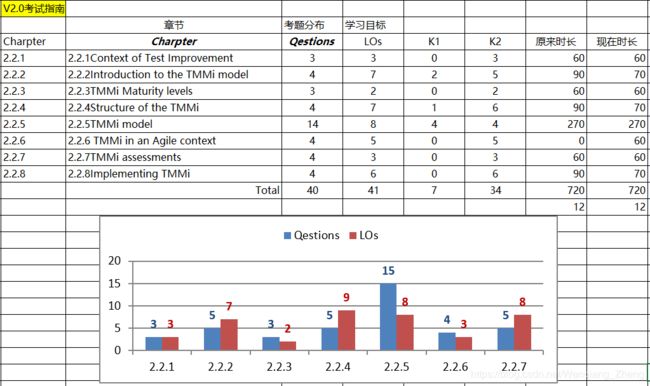L0-00TMMi Professional考试指南V2.0
TMMi Professional的考试指南V2.0发布了,相对于V1.0版本,V2.0考试指南还是做了一些比较大改动。关于V1.0版本的详细内容,请参考文章“TMMi Professional考试指南V1.0”。本文将从几个方面完整阐述V2.0版本的考试指南:
-
参考资料
-
考题分布
-
学习目标
1、参考资料
相对于V1.0的考试指南,V2.0中更新了考试范围和学习目标,因此TMMi Professional考试的参考资料也做了一些变更。主要包括:
-
TMMi Framework R1.2(2018),TMMi Foundation(www.TMMi.org);
-
The Little TMMi – Objective-Driven Test Process Improvement (2011), E. van Veenendaal and J.J.Cannegieter, UTN Publishing (www.utn.nl);
-
TMMi in the Agile world, Version 1.3 (2019), E. van Veenendaal (ed.), TMMi Foundation (www.tmmi.org);
2、考题分布
参加TMMi认证考试的学员,可以参加TMMi认证培训,但是参加培训不是必需的,学员也可以直接报名参加考试。具体考试要求如下:
-
考题数目:40道,单选;
-
分值:每道题目分值为1分,总共40分;
-
通过要求:准确率达到65%及以上,即26分及以上为通过;
-
考试时长:60分钟,假如非母语考试,增加15分钟;
相较于V1.0考试指南,V2.0的学习目标数量、级别、考题分布等都做了一些调整。但是整体培训时间没有变化,还是原来的720分钟。具体的分布如下:
为了学员方便比较两个版本之间的区别,我将原来V1.0版本的数据也放在这里,供大家进行比较。
3、学习目标
第1章 测试改进背景
授课时间:60分钟;学习目标:3个K2;Main source: “The Little TMMi” chapter 1
[K2] Provide examples of the typical business reasons for test improvement.
[K2] 举例说明测试改进的典型业务原因。
[K2] Understand the different aspects of testing that can be improved
[k2] 理解可改进的测试的不同方面
[K2] Summarize typical costs and benefits of the TMMi
[k2] 总结TMMi的典型成本和效益
第2章 TMMi简介
授课时间:70分钟;学习目标:7个K2;Main source: “The TMMi model” chapter 1
[K2] Summarize the structure of the CMMI process improvement model
[K2] 总结CMMI过程改进模型的结构
[K2] Understand the aspects of the CMMI model with testing-specific relevance
[K2] 了解CMMI模型与特定测试相关的各个方面
[K2] Compare the suitability of CMMI for test process improvement to the TMMi model developed specifically for test process improvement
[K2] 将CMMI对测试过程改进的适用性与专为测试过程改进开发的 TMMi 模型进行比较
[K2] Compare the continuous and staged representation including their strengths and weaknesses
[K2] 比较连续型和阶段型类型,包括它们的优势与弱势
[K1] List the sources, e.g., TMM, used during the development of the TMMi model
[K1] 列出在TMMi模型开发过程中使用的参考资料,例如TMM模型
[K2] Understand the evolution of the testing process as described by Gelperin and Hetzel
[K2] 了解Gelperin和Hetzel描述的测试过程演变
[K1] Describe the scope of the TMMi model
[K1] 描述TMMi 模型的范围
第3章 TMMi级别
授课时间:60分钟;学习目标:2个K2;Main source: “The TMMi model” chapter 2
[K2] Summarize the TMMI maturity levels and process areas
[K2]总结TMMi成熟度级别和过程域
[K2] Explain the TMMi maturity levels
[K2]解释TMMi成熟度级别
第4章 TMMi结构
授课时间:70分钟;学习目标:6个K2和1个K1;Main source: “The TMMi model” chapter 3
[K2] Summarize the components of the TMMi model
[K2] 总结TMMi模型的组件
[K2] Explain the difference between a required, expected and informative component
[K2] 解释必需、预期和信息型组件之间的区别
[K2] Categorize the components of the TMMi model by type (required, expected, informative)
[K2] 按类型(必需、预期、信息)对TMMi模型的组件进行分类
[K2] Summarize the generic goals of the TMMi model
[K2] 总结TMMi模型的通用目标
[K2] Understand the two levels of institutionalization related to the generic goals GG2 and GG3
[K2] 了解与通用目标GG2和GG3相关的两个制度化级别
[K1] Recognize the generic practices of both GG2 and GG3
[K1] 认识GG2和GG3的通用实践
[K2] Summarize the relationship between TMMi and CMMI
[K2] 总结TMMi和CMMI之间的关系
第5章 TMMi模型
授课时间:270分钟;学习目标:4个K2和4个K1; Main source: “The TMMi model” chapter 3
[K2] Summarize the TMMi level 2 process areas (Test Policy and Strategy, Test Planning, Test Monitoring and Control, Test Design and Execution and Test Environment) and specific goals
[K2] 总结TMMi 2级过程域(测试方针和策略、测试计划、测试监督和控制、测试设计和执行以及测试环境)和特殊目标
[K1] Recognize the specific practices of the TMMi level 2 process areas (Test Policy and Strategy, Test Planning, Test Monitoring and Control, Test Design and Execution and Test Environment)
[K1] 识别TMMi 2级过程域(测试方针和策略、测试计划、测试监督和控制、测试设计和执行以及测试环境)的特殊实践
[K2] Summarize the TMMi level 3 process areas (Test Organization, Test Training, Test Lifecycle and Integration, Non-Functional Testing and Peer Reviews) and specific goals
[K2] 总结TMMi 3级过程域(测试组织、测试培训、测试生命周期和集成、非功能测试、同行评审)和特殊目标
[K1] Recognize the specific practices of the TMMi level 3 process areas (Test Organization, Test Training, Test Lifecycle and Integration, Non-Functional Testing and Peer Reviews)
[K1] 识别TMMi 3级过程域(测试组织、测试培训、测试生命周期和集成、非功能测试、同行评审)的特殊实践
[K2] Summarize the TMMi level 4 process areas (Test Measurement, Software Quality Evaluation, Advanced Reviews) and specific goals
[K2] 识别TMMi 4级过程域(测试测量、软件质量评估、高级评审)的特殊目标
[K1] Recognize the specific practices of the TMMi level 4 (Test Measurement, Software Quality Evaluation, Advanced Reviews) process areas
[K1] 识别TMMi 4级过程域(测试测量、软件质量评估、高级评审)的特殊实践
[K2] Summarize the TMMi level 5 process areas (Quality Control, Defect Prevention and Test Process Optimization) and specific goals
[K2] 识别TMMi 5级过程域(质量控制、缺陷预防、测试过程优化)的特殊目标
[K1] Recognize the specific practices of the TMMi level 5 process areas (Quality Control, Defect Prevention and Test Process Optimization)
[K1] 识别TMMi 5级过程域(质量控制、缺陷预防、测试过程优化)的特殊实践
第6章 TMMi敏捷
授课时间:60分钟;学习目标:5个K2; Main source: “TMMi in the Agile world”
[K2]Understand how TMMi can be used in an Agile context, and how the two can complement each other.
[K2]了解如何在敏捷上下文中使用 TMMi,以及两者如何相互补充
[K2]Understand the difference doing test process improvement in an Agile context compared to doing this in a traditional context.
[K2]了解在敏捷周境中和在传统周境中进行测试过程改进的不同点
[K2] Explain with examples how the TMMi level 2 process areas, goals and practices should be interpreted and can be used in an Agile context.
[K2]通过示例说明TMMi 2级过程域、目标和实践是如何在敏捷周境中得到解释和使用的
[K2]Explain with examples how the TMMi level 3 process areas, goals and practices should be interpreted and can be used in an Agile context.
[K2]通过示例说明TMMi 3级过程域、目标和实践是如何在敏捷周境中得到解释和使用的
[K2]Understand how the process areas and practices at TMMi levels 4 and 5 can be used in an Agile context.
[K2]了解如何在敏捷中使用TMMi级别4和5的过程域和实践
第7章 TMMi评估
授课时间:60分钟;学习目标:3个K2;Main source: “The Little TMMi” chapter 4
[K2] Explain the role of assessments with the overall improvement process
[k2]在总体改进过程中解释评估的角色
[K2] Compare informal assessments to formal assessment
[K2]比较非正式评估和正式评估
[K2] Summarize the generic assessment process
[K2]总结通用的评估过程
第8章 TMMi实施
授课时间:70分钟;学习目标:6个K2; Main source: “The Little TMMi” chapter 5
[K2] Summarize the activities of the initiating phase of the improvement framework
[K2] 总结改进框架启动阶段的活动
[K2] Summarize the key elements of a test policy
[K2] 总结测试策略的关键要素
[K2] Summarize the activities of the diagnosing phase of the improvement framework
[K2] 总结改进框架诊断阶段的活动
[K2] Summarize the activities of the establishing phase of the improvement framework
[K2] 总结改进框架的建立阶段的活动
[K2] Summarize the activities of the acting phase of the improvement framework
[K2] 总结改进框架作用阶段的活动
[K2] Summarize the activities of the learning phase of the improvement framework
[K2] 总结改进框架学习阶段的活动

